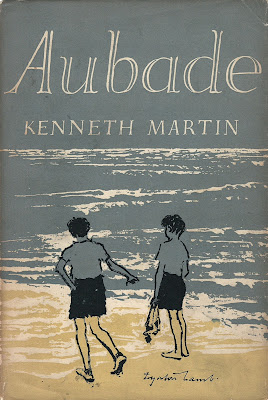%20Matelot%20accoude%CC%81,%201929.jpg) |
| Matelot accoudé (1929) Frans Masreel (Flemish, 1889-1972) Oil on canvas 100 x 81 cm |
Tuesday, May 31, 2022
Wednesday, May 18, 2022
Aubade by Kenneth Martin
 |
| London : Chapman & Hall, 1957 |
One day, the young man Paul has named Gary (we later find that his name is John Knight) enters the tobacco shop. Paul had noticed him in church sometime earlier and had thought about what it might be like to be friends with him. Those overwhelming feelings of wanting to spend time with him initially go unclassified, but when they do start spending time together it begins to be clear there is mutual feeling and also what those feelings mean. The battle between one's own feelings and desires versus what one's parents or society expects is ever present as is a pervasive loneliness.
The writing is straightforward, almost blunt. It is easy to judge the authorial skill based on the author's age. To do so, though, would be unfair. The straightforward style is in keeping with Paul's desire to keep people at a distance. Many of the things he says are harsh and in many ways they serve to insure that he will remain lonely. He even says at one point that there is joy in misery. Early on in the novel, the author uses the poem, Black Marigolds, foreshadowing the feelings of sadness related to remembering a first love. Later in the novel, Paul says he "want[s] to remember Gary, and be sad, always."
Black Marigolds is a poem originally written in Sanskrit a portion of which appeared in John Steinbeck's Cannery Row.